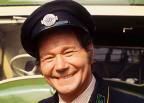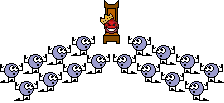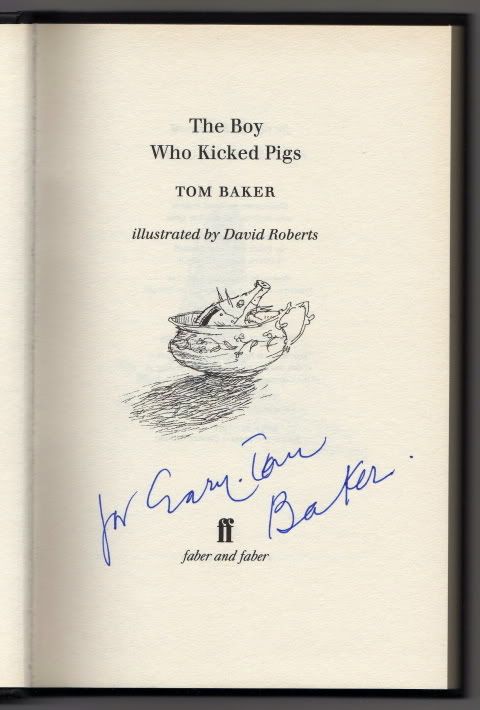Post by Lieutenant Columbo on Oct 4, 2006 22:18:28 GMT
You like autobiographies?
Then this is right up your street!
Released in 1991, this is a truly remarkable book - some funny stuff in there - pants-wettingly funny at times, but also some very moving and sad tales there too - this really is a worthwhile read about one of televisions best known and best loved actors.
Tells you all about him wanting to be an Orphan.
The tale of the prodigious f*rter.
His desecrated gravestone.
His father's scalded b*lls and the cheeky budgie.
His life as a monk.
How he was mistaken for Shirley Williams.
etc. etc.
Here's some info. I've got on his early life... of which he discusses in the book - not a 'silver spoon' upbringing by any means!
Tom was born in 1934, in Liverpool. His mother, Mary Jane, a cleaner and barmaid, and his father, Stewart, a sailor always seemed to be fighting a losing battle against poverty. During the war, the family house sheltered as many as 14 people and his earliest memories are of overcrowding and filth and the cockroaches that infested the house.
He confesses how he would fantasise about becoming an orphan; he even imagined his mother being killed by a bomb. That way he would be taken away from the Liverpool slums and be given the love he thought he lacked. To compensate, Tom turned to the Catholic Church for comfort, but it wasn't long before he became disillusioned. He was forced to repeat the words, 'I am nothing' in Latin and English over and over until he truly believed that he was unworthy of human love or compassion. 'I think it's been very difficult to get away from the fact that as a child I was brought up to loathe myself,' he says. At 17 he entered a monastery on Jersey. Woken at 4.30am, he would spend the day praying silently - the apprentice monks were not allowed to speak or even look at one another. 'The whole point was to learn humility and practice obdience,' says Tom. 'Yet the real point was the annihilation of self and I suppose that's where I lost myself for ever.'
After five years, he dared to question certain aspects of the monastery and was expelled.
Adjusting to life outside proved difficult; one wonders whether he ever managed to make that transition successfully. He remembers on his release how, because he had been forbiden to look at his fellow monks for five years, he felt compelled to stare intensely at strangers. His view of women had been warped by his experience, leaving him unable to form lasting relationships.
After a spell in the Royal Army Medical Corps, he decided he wanted to be an actor, and went to the Rose Bruford College of Speech and Drama, in Sidcup, Kent, where he met and fell in love with the woman who would be his first wife - Anna Wheatcroft. One of the characteristics he found attractive in her was the air of self-assurance that came from being comfortably off - her family belonged to the famous rose-growing dynasty. Despite their differences in background and personal wealth, the couple married, in Stratford, in 1960. It was, by all accounts a disasterous relationship - the Wheatcrofts made him feel deeply inadequate and his self-esteem hit an all-time low.
Depressing stuff eh?
But have a look at the book - there's LOADS of humour in there too - one of my favourite reads this!
And the audio book is also worth a listen - to hear Tom tell it like it is!
Recommended!
N.
Then this is right up your street!
Released in 1991, this is a truly remarkable book - some funny stuff in there - pants-wettingly funny at times, but also some very moving and sad tales there too - this really is a worthwhile read about one of televisions best known and best loved actors.
Tells you all about him wanting to be an Orphan.
The tale of the prodigious f*rter.
His desecrated gravestone.
His father's scalded b*lls and the cheeky budgie.
His life as a monk.
How he was mistaken for Shirley Williams.
etc. etc.
Here's some info. I've got on his early life... of which he discusses in the book - not a 'silver spoon' upbringing by any means!
Tom was born in 1934, in Liverpool. His mother, Mary Jane, a cleaner and barmaid, and his father, Stewart, a sailor always seemed to be fighting a losing battle against poverty. During the war, the family house sheltered as many as 14 people and his earliest memories are of overcrowding and filth and the cockroaches that infested the house.
He confesses how he would fantasise about becoming an orphan; he even imagined his mother being killed by a bomb. That way he would be taken away from the Liverpool slums and be given the love he thought he lacked. To compensate, Tom turned to the Catholic Church for comfort, but it wasn't long before he became disillusioned. He was forced to repeat the words, 'I am nothing' in Latin and English over and over until he truly believed that he was unworthy of human love or compassion. 'I think it's been very difficult to get away from the fact that as a child I was brought up to loathe myself,' he says. At 17 he entered a monastery on Jersey. Woken at 4.30am, he would spend the day praying silently - the apprentice monks were not allowed to speak or even look at one another. 'The whole point was to learn humility and practice obdience,' says Tom. 'Yet the real point was the annihilation of self and I suppose that's where I lost myself for ever.'
After five years, he dared to question certain aspects of the monastery and was expelled.
Adjusting to life outside proved difficult; one wonders whether he ever managed to make that transition successfully. He remembers on his release how, because he had been forbiden to look at his fellow monks for five years, he felt compelled to stare intensely at strangers. His view of women had been warped by his experience, leaving him unable to form lasting relationships.
After a spell in the Royal Army Medical Corps, he decided he wanted to be an actor, and went to the Rose Bruford College of Speech and Drama, in Sidcup, Kent, where he met and fell in love with the woman who would be his first wife - Anna Wheatcroft. One of the characteristics he found attractive in her was the air of self-assurance that came from being comfortably off - her family belonged to the famous rose-growing dynasty. Despite their differences in background and personal wealth, the couple married, in Stratford, in 1960. It was, by all accounts a disasterous relationship - the Wheatcrofts made him feel deeply inadequate and his self-esteem hit an all-time low.
Depressing stuff eh?
But have a look at the book - there's LOADS of humour in there too - one of my favourite reads this!
And the audio book is also worth a listen - to hear Tom tell it like it is!
Recommended!
N.









